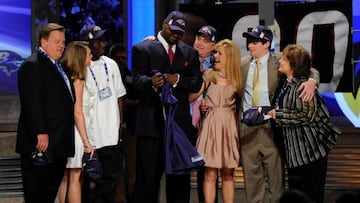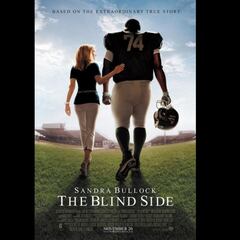What is conservatorship? How is it different from adoption in Michael Oher’s ‘The Blind Side’ case?
In light of Michael Oher’s recent petition, there’s been discussion about the differences between adoption and conservatorship. Here’s a look at what they are.


As the public comes to terms with the revelations that stemmed from former NFL player Michael Oher’s declaration, that he was not fairly compensated for the use of his story in the film “The Blind Side”, the precarious nature of legal guardians, and their relationship with the finances of the child they care for has been thrust into the spotlight.
What is adoption?
As defined by Child Protection Services (CPS), adoption is “the legal process through which a child joins a family different from his or her birth parents. Adoption is a permanent lifelong commitment to a child. In CPS cases, adoption becomes an option if CPS and the child’s birth parents cannot resolve issues that made it unsafe for the child to live at home. Then, CPS may suggest to the court to end the parents’ rights to the child and place the child with another family permanently. A child can also become legally free for adoption if both birth parents give up their parental rights.”
Michael Oher said he was never actually adopted pic.twitter.com/BVfIKZOdVM
— Morning Brew Daily (@mbdailyshow) August 15, 2023
As we know in the case of Michael Oher, he has stated that the Tuohy family did not actually adopt him as presented in the 2009 film, “The Blind Side”, but rather took on the role of a conservatorship, from which they were able to profit from his name, image, and likeness. This of course brings us to the question of what is a conservatorship and how can it allow individuals to benefit from the earnings of the child that they are legally tasked with providing for?
So, what is a conservatorship?
If we once again turn to CPS for clarity, Permanent Managing Conservatorship (PMC) “is a legal term used in child custody cases. It means that a judge appoints a person to be legally responsible for a child without adopting the child. The court can give PMC to someone other than a parent, including DFPS, a relative, a close family friend, or a foster parent. PMC can only be given by a judge. The judge decides the rights and responsibilities, depending upon the specific situation. When someone other than a parent is named as “permanent managing conservator,” he or she is given certain rights and duties about caring for the child such as the right or duty to perform the following:
- Physically possess the child
- Choose moral and religious training
- Provide clothing, food, shelter, and education
- Provide and consent to medical, psychiatric, psychological, dental, and surgical care
- Get the child’s medical records
- Receive money that supports the child
- Hold or give out money that benefits the child
- Consent to get married; Consent to join armed forces
- Represent the child in legal issues
- Make legal decisions
- Decide where the child lives and goes to school
- Make other decisions that the child’s parent would normally make.
Related stories
As you can see from the list above, legal and financial decisions can in fact be made by the individual who has been appointed as conservator, which again, appears to form the basis of Oher’s case against the Tuohy family. At this point, Oher, a former offensive tackle who spent eight years in the NFL, is asking for the conservatorship to be dissolved. In addition, the 37-year-old is also requesting that the Tuohy family account for his assets, as required by the conservatorship; pay him any money he was owed over the years with interest; pay his attorney fees and punitive damages; and last but not least, that the family is sanctioned for violating the terms of the conservatorship.
UPDATE: The Tuohy family responds to Michael Oher's allegations that they faked adoption for Millions: "We're devastated"
— Daily Loud (@DailyLoud) August 15, 2023
Oher, 37, petitioned a Tennessee judge on Monday saying that he had never been adopted by the family, and instead was under a conservatorship. He alleged in… pic.twitter.com/E5bXg0D4ah
To be clear, “The Blind Side” went on to make roughly $300 million at the worldwide box office. That’s to say that the Tuohys made millions, while Oher - according to his petition - received no compensation in any form. Indeed, Oher has also alleged that his name was signed on a 2007 document that would give 20th Century Fox “without any payment whatsoever, the perpetual, unconditional and exclusive right throughout the world to use and portray Michael Oher’s name, likeness, voice, appearance, personality, personal experiences, incidents, situations, and events.” As one can imagine, this situation is just getting started but rest assured it’s going to get a lot uglier before we see any form of resolution.

